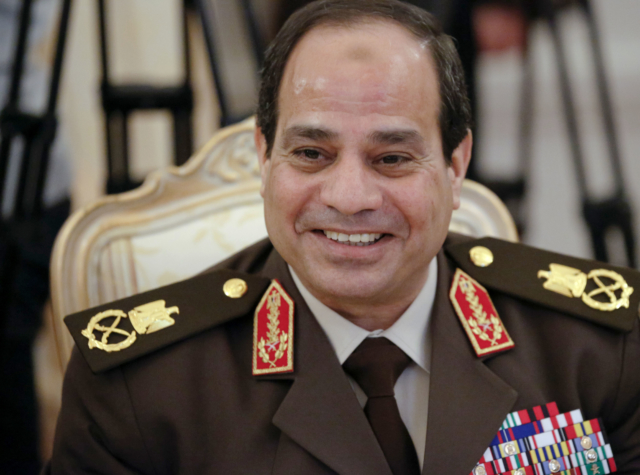Former Egyptian army chief Abdel Fattah al-Sisi won a landslide victory in a presidential election on Thursday. However, a low turnout may have deprived him of the strong mandate he needs to fix the economy and face down an Islamist insurgency.
Sisi won 93.3 percent of votes cast, judicial sources said, with most ballots counted after three days of voting. His only rival, leftist politician Hamdeen Sabahi, gained 3 percent while 3.7 percent of votes were declared void. But a lower-than-expected turnout figure raised questions about the credibility of a man idolised by his supporters as a hero who can deliver stability.
The stakes are high for Sisi in a country where street protests have helped topple two presidents in three years. Since a series of television interviews he gave ahead of the vote, many Egyptians feel Sisi has not spelled out a clear vision of how he would tackle Egypt’s problems, instead making a general call for people to work hard and be patient.
He has presented vague plans to remedy the economy, suffering from corruption, high unemployment, and a widening budget deficit aggravated by fuel subsidies that could cost nearly $19 billion in the next fiscal year. “All in all the weak turnout will make it harder for Sisi to impose painful economic reforms that international institutions and investors are demanding,” said Anna Boyd, an analyst at London-based IHS Jane’s. Investors want Sisi to end energy subsidies, impose a clear tax regime and give guidance on the direction of the exchange rate.
Turnout was about 46 percent of Egypt’s 54 million voters, the government said, less than the 40 million votes, or 80 percent of the electorate, that Sisi had called for last week. It was also less than the 52 percent turnout secured in the 2012 presidential election by Mohamed Mursi, the Islamist leader Sisi ousted last year after mass protests against his rule.
A Reuters tour of polling stations suggested turnout was low. Many Egyptians said voters had stayed at home due to political apathy, opposition to another military man becoming president, discontent at suppression of freedoms among liberal youth, and calls for a boycott by Islamists.
Report compiled with information from Reuters.
 CGTN America
CGTN America FILE – In this Thursday, Feb. 13, 2014 file photo, Egypts military chief Field Marshal Abdel-Fattah el-Sisi smiles as he speaks to Russian Foreign Minister Sergey Lavrov during their talks in Moscow, Russia. The election of Egypt’s former military chief to the nation’s presidency may be remembered for its central irony: He won in a historic landslide only to shatter his image of invulnerability in the process. El-Sisi’s win was never in doubt, but what the retired 59-year-old field marshal wanted was an overwhelming turnout that would accord legitimacy to his July ouster of Egypt’s first freely elected president the Islamist Mohammed Morsi and show critics at home and abroad that his action reflected the will of the people. (AP Photo/Alexander Zemlianichenko, File)
FILE – In this Thursday, Feb. 13, 2014 file photo, Egypts military chief Field Marshal Abdel-Fattah el-Sisi smiles as he speaks to Russian Foreign Minister Sergey Lavrov during their talks in Moscow, Russia. The election of Egypt’s former military chief to the nation’s presidency may be remembered for its central irony: He won in a historic landslide only to shatter his image of invulnerability in the process. El-Sisi’s win was never in doubt, but what the retired 59-year-old field marshal wanted was an overwhelming turnout that would accord legitimacy to his July ouster of Egypt’s first freely elected president the Islamist Mohammed Morsi and show critics at home and abroad that his action reflected the will of the people. (AP Photo/Alexander Zemlianichenko, File)
